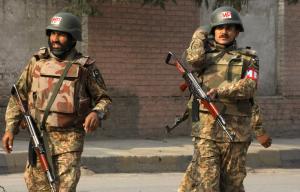ISLAMABAD, May 29 (UPI) — The family of a Pakistani cab driver killed last week in the U.S. drone strike targeting an Afghan Taliban leader lodged a formal complaint with police against unnamed U.S. officials.
The deceased driver, Mohammad Azam, was transporting Taliban chief Mullah Akhtar Mansour when drone-fired missiles struck the taxi in Pakistan’s southwestern Baluchistan province, killing both of them, Voice of America reported.
DNA tests confirmed it was Mansour killed in the missle attack that also killed the taxi driver.
Police in the remote district of Noshki, where the May 21 drone missile attack took place, confirmed Sunday that Azam’s relatives have filed what is called a First-Information Report against unnamed U.S. officials, setting legal wheels in motion.
“My brother, a father of four children, was innocent and the sole bread earner for his extremely impoverished family,” the deceased driver’s brother, Mohammad Qasim, said in his complaint registered with Noshki police station.
Qasim said Azam had no links to any terror groups and his job was to ferry passengers in his taxi. Azam had been working for more than eight years as a driver in Taftan, a tiny desert town next to an important border crossing with Iran.
“I seek justice and legal action against American authorities responsible for the attack. I do not know their names but media has quoted them as claiming to have used explosive material to kill my brother,” Qasim said in the complaint.
Quetta-based attorney, Tahir Hussain, told Voice of America that Azam’s family is likely to seek a trial in absentia if U.S. officials refuse to respond and the family may attempt to push for monetary compensation.
The unprecedented drone missile attack has thrown into uncertainty possible peace talks with the Taliban as well as U.S.-Pakistani relations, The Guardian reported.
A week after Azam’s death his children remain distraught and tearful. They describe their father as a “martyr”.
“Who will feed them now?” Qasim said. “I appeal to the civilized world, including all those human rights bodies, to investigate the brutal murder of my brother and compensate his children.”
A series of chance occurrences reportedly led to Azam driving one of the men most sought by U.S. military officials.
He worked for a small local transport company owned by Habib Saoli, which has its office near the exit of the Iranian-Pakistani border facility.
Mansour emerged from that building shortly after 9 a.m. on May 21, returning to Pakistan after a long visit to Iran.
He was passing himself off as a Pakistani citizen using a passport and national ID card with the false name Muhammad Wali.
That false identity led some to speculate it was not Mansour killed in the attack.
Verification was issued after confirmation regarding Mansour’s identity was received through a DNA test, DunyaNews.TV reported.
DNA was collected from a close relative of Mansour’s when he came to collect his dead body, a SAMAA.TV report states.

COMMENTS
Please let us know if you're having issues with commenting.